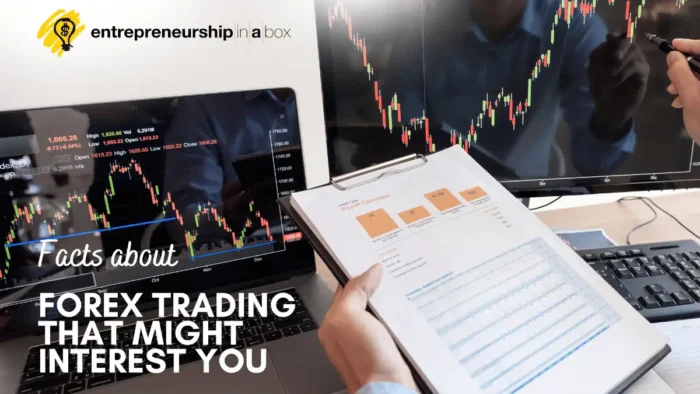You may have heard about forex but are unsure what it is. Forex trading is, in the simplest terms, the act of trading foreign currency. How people buy, sell, and trade stocks is similar to how forex works, but in this case, people are purchasing different currencies, evaluating their value, and trying to earn a profit.
This trading is an exciting way to earn money, but it is not something you can jump right into expecting success. Like stock trading, you need to go in with a system or strategy, and most importantly, you need to go in with some knowledge. These forex facts could interest you and, in the very best case, help you make money as you become a better trader.
In this article, we’ll take you through forex trading and drop some mind-blowing forex facts along the way. Whether you’re a forex broker, a seasoned trader, or a complete beginner, these forex facts will open your eyes to the exciting and dynamic world of foreign exchange.
What is Forex Trading?
Forex trading, also known as foreign exchange trading, is the buying and selling of currencies on the foreign exchange market. It is a decentralized market where participants, including banks, financial institutions, and individual traders, exchange one currency for another. The goal of money trading is to profit from the fluctuations in currency exchange rates.
Centuries before the emergence of cryptocurrencies, the Forex markets were already in existence as a platform for trading currencies. The Forex markets have been a crucial part of the global economy, providing a means for individuals and businesses to conduct international trade and exchange currencies. As an established market with a long history, the Forex markets have seen significant developments and innovations over time.
This trading option offers numerous benefits, such as high liquidity, low transaction costs, and the ability to trade 24 hours a day. It allows you to participate in the global economy and exploit opportunities in different currencies.
How Forex Works
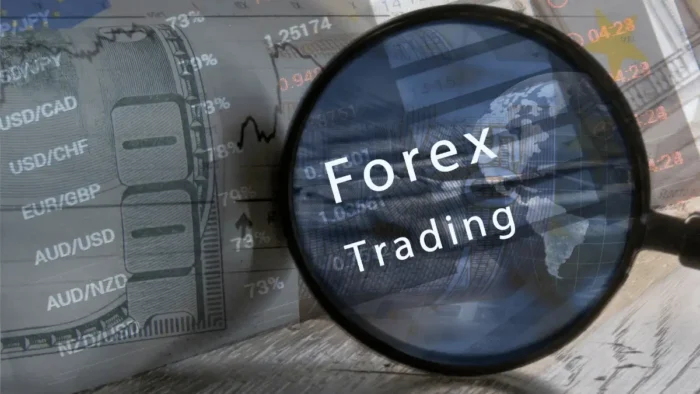
Forex involves buying one currency while simultaneously selling another. Currencies, such as EUR/USD or GBP/JPY, are always traded in pairs. The first currency in the pair is the base currency, and the second currency is the quote currency. The exchange rate represents the value of one currency compared to another.
You can go long or short on a currency pair when trading forex.
Going long means buying the base currency and selling the quote currency, expecting the base currency to appreciate in value.
Conversely, going short means selling the base currency and buying the quote currency, anticipating a decline in the base currency’s value.
Let’s look at some essential forex facts you need to know:
Fact #1: The Forex Market is the Largest Financial Market in the World
Do you know how much is traded every day in Forex markets?
The global forex market size is the largest and most liquid financial market globally, with an average daily turnover of over $7.5 trillion. This volume of trading in forex markets surpasses the stock market by a massive margin, making it an attractive market for traders.
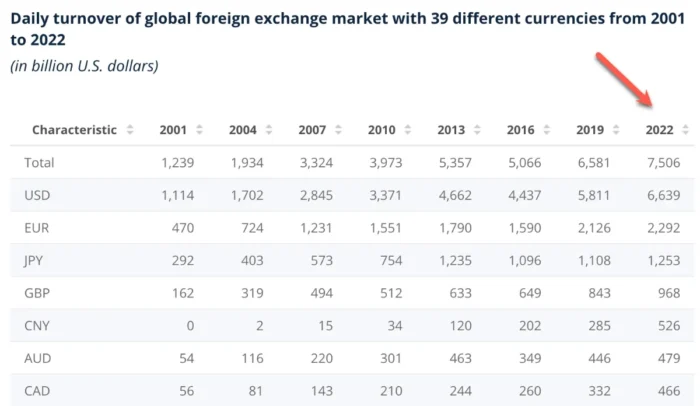
The forex market’s size and liquidity ensure that traders can easily enter and exit positions at any time without worrying about market manipulation. It also means that even large trades have minimal impact on exchange rates, making it difficult for any single entity to control the forex market.
Related: How to Create a Small Forex Trading Business
Fact #2: It is Open 24 Hours a Day, 5 Days a Week
Unlike other financial markets, such as the stock market, which has set trading hours, the forex market is open 24 hours a day, five days a week. This means that trading can occur anytime, allowing traders worldwide to participate during local business hours.
The forex market’s continuous operation is made possible by its global nature. As one major financial center closes for the day, another one opens, ensuring that there is always an active market somewhere in the world. This allows traders to react to news and events in real-time without waiting for the market to open.
Fact #3: Forex Requires Understanding of Currency Pairs
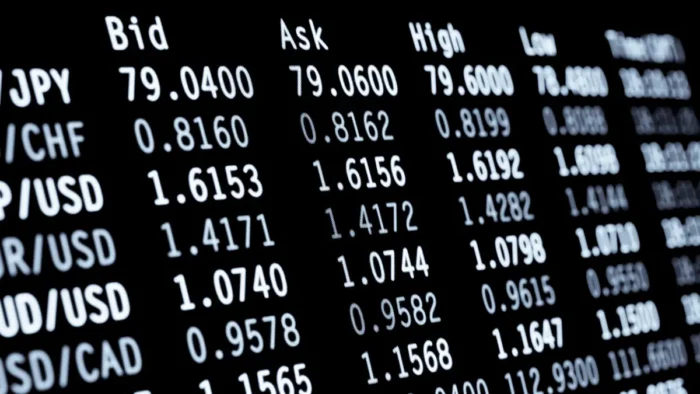
In forex, currency pairs are the foundation of every trade. Understanding how currency pairs work is crucial for successful trading. Major currency pairs have base currency and a quote currency. The base currency is the first currency in the pair and represents the currency you buy or sell. The quote currency is the second currency in the pair and represents the currency you use to make the transaction.
Currency pairs are quoted in terms of the exchange rate, representing the value of one currency compared to another. For example, if the EUR/USD exchange rate is 1.20, one euro equals 1.20 US dollars.
Various factors, such as economic indicators, geopolitical events, and market sentiment, drive changes in exchange rates.
Fact #4: Leverage is Commonly Used in Foreign Exchange Trading

Leverage is a powerful tool that allows you to control larger positions with less capital. It amplifies both profits and losses, making it a double-edged sword.
Leverage is expressed as a ratio, such as 1:100 or 1:500. This ratio indicates the amount of capital required to open a position relative to the position’s actual value.
For example, with a leverage ratio of 1:100, you can control a position worth $100,000 with just $1,000 of capital. While leverage can generate significant returns, it also increases the risk of loss. It is important to use leverage responsibly and have a solid risk management strategy in place.
Related: How Forex Trading May Financially Help Your Business
Fact #5: Central Banks Have a Significant Impact on Foreign Exchange Market
Central banks play a crucial role in the forex markets. They are responsible for formulating and implementing monetary policy, influencing an economy’s interest rates and money supply. Their decisions can profoundly impact currency exchange rates, making them a key consideration for forex traders.
When a central bank raises interest rates, it attracts foreign investment, increasing the currency’s value. Conversely, when a central bank lowers interest rates, it encourages borrowing and spending, which can lead to a depreciation in the currency’s value. Traders closely monitor central bank announcements and statements for clues about future monetary policy actions.
Fact #6: Forex Market Can Be Highly Volatile

Volatility is a common characteristic of the forex market. Currency exchange rates can fluctuate rapidly due to economic data releases, geopolitical events, and market sentiment. This volatility presents both opportunities and risks for traders.
High volatility can result in significant price movements, allowing traders to profit from rapid market swings. However, it also increases the risk of losses, as prices can move against a trader’s position just as quickly. Successful forex traders understand how to navigate volatile market conditions and adapt their strategies accordingly.
Fact #7: Automated Trading Systems are Popular in Foreign Exchange Trading
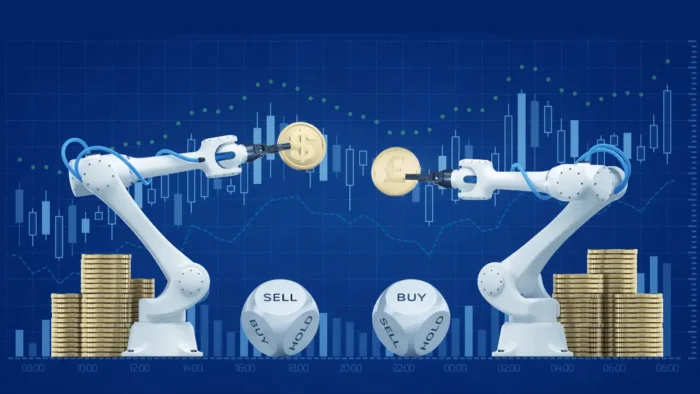
In recent years, automated trading platforms and systems, also known as forex robots or expert advisors, have gained popularity in the forex community. These systems use algorithms and predefined rules to execute trades automatically. They aim to remove human emotions and biases from trading and exploit market inefficiencies.
Automated trading systems can analyze vast amounts of data in real time, identify trading opportunities, and execute trades precisely and quickly. They can operate 24/7 without the need for constant monitoring, allowing traders to take advantage of opportunities even when they are not actively trading.
Fact #8: Most of the Forex Transactions Take Place Online
Forex trading, or Foreign Exchange trading, is largely conducted online and is a primary example of the globalization of financial markets.
Online forex brokers act as intermediaries, providing retail traders with access to online trading platforms where they can speculate on currency price movements. With more than 80 forex currency pairs available for trading, competitive pricing, and web and mobile platforms, Forex trading is accessible and convenient.
According to data from the Bank for International Settlements (BIS), in 2019, 56% of all forex trading was done electronically. As per a survey by the BIS in 2022, the turnover of FX swaps accounted for 51% of the global turnover, an increase from 49% in 2019. Spot trades, on the other hand, fell to 28% from 30% in the same period. These statistics highlight the significant role online platforms play in facilitating forex trades.
On a more granular level, retail trading, which includes trading by non-professionals, accounts for just 5.5% of the entire global market. This underscores the dominance of institutional investors in forex market, many of whom rely heavily on electronic trading systems.
Fact #9: Forex Involves Both Technical and Fundamental Analysis
Forex requires a blend of technical and fundamental analysis. Technical analysis involves studying historical price data, chart patterns, and indicators to identify trends and make trading decisions. On the other hand, fundamental analysis focuses on economic and political factors influencing currency exchange rates.
Successful traders often combine both approaches to understand the market comprehensively. They analyze charts and indicators to identify entry and exit points in currency markets while also staying informed about economic indicators, central bank decisions, and geopolitical events that can impact currency movements.
Fact #10: Forex Trading Can Be Risky but Rewarding
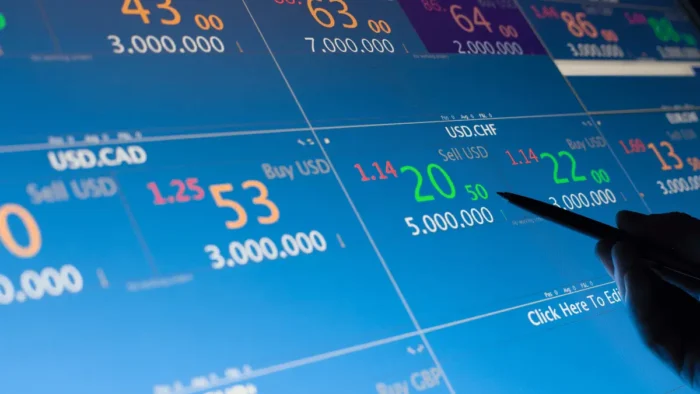
Forex offers the potential for substantial profits but comes with inherent risks. The high volatility and leverage involved in the forex market can result in significant losses if not managed properly. Developing a solid trading plan, setting realistic profit targets, and implementing effective risk management strategies are crucial.
Successful forex traders understand the importance of discipline, patience, and continuous learning. They know the risks involved and are prepared to adapt their strategies to changing market conditions. With proper education and practice, trading can be a rewarding endeavor.
The problem with taking risks is that all people see are the results of the few who find success and not the many who lose out. Going on forex markets is no guarantee of money, just like the stock market.
The risk factor of forex trading is undoubtedly an eye-opener to many who are just getting into it, but it is always good to know just how risky it can be and why you should not expect it to be a get-rich-quick scheme.
Fact #11: Education and Practice are Essential for Success
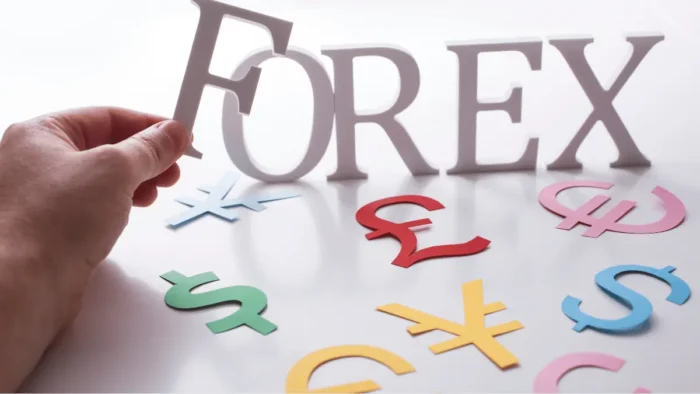
To succeed in forex, education, and practice are paramount. Understanding the fundamental concepts, technical analysis tools, and risk management strategies is crucial for making informed trading decisions. Traders should use educational resources like online courses, webinars, and books to deepen their knowledge.
Practice is equally essential. Opening a demo trading account allows traders to test their strategies in a risk-free environment using virtual funds. It allows them to gain experience, refine their skills, and build confidence before trading with real money.
Continuous learning and practice are crucial to improving trading performance and achieving long-term success in the forex industry.
If you are still unsure about forex, you can start what is referred to as a demo account to practice your buying, selling, and trading of foreign currencies. This is a great way to practice how it all works without the risk of losing money, helps you develop a strategy, and lets you understand the risks involved. Practice makes perfect, and it is good to know that this is something that you can try.
Fact #12: Thinking Simple Pays Off

Many people get starry-eyed when it comes to financial trading and investing. The problem is that blinding yourself with ambition could stifle your goals from happening at all. Instead of going into trading believing you need some complex calculations, it is good to know that starting simple or keeping it simple in the long run is actually quite helpful.
A simple strategy based on proven techniques is often a good way to ensure a lower volatility rate and manage your expectations. Sometimes swinging for the fences pays off – but not every swing will be a home run. In short, keeping your strategy and expectations simple until you can find a new way to do your trading is good to know.
Related: A Guide On Online Forex Trading With XFR Financial Ltd
Fact #13: Forex Markets are Closely Tied With Economic Change
As expected, changing economic policy and economic situations will be key to understanding currency trading. Economic impact on currencies has a direct correlation on forex trading for the basic fact that the currencies are tied to how a country’s economic outlook and performance is doing. This is a large part of how forex can be understood on a macroeconomic level, that currencies and economies are large functions that can determine on smaller levels what you can sell, buy, or trade.
Reading about fundamental analysis gives more insight into this topic to learn more about how to trade forex. This is a good way to understand forex in real-world scenarios.
Fact #14: Currency Trading is Shared By a Select Group
By “select group,” we mean the currencies of certain countries, and by “shared,” it means how much of these countries control the forex market. The U.S. and U.K. make up about 50% of all trading by participants, and the rest of the world makes up the other half, but it can be broken down even further.
The most commonly traded currencies come from some usual suspects with strong currencies. USD, GBP, EUR, AUD, CAD, and NZD are among the most commonly traded currencies, with the USD being the most common because of its use as an international standard currency for business.
Conclusion
Forex trading is an interesting market because it is so valuable. The trade and sale of currency is a huge financial market in which many people participate. The important thing to know about forex trading is that knowing its functions and navigating them will help prepare you for when you take the leap and start trading and selling currencies for yourself.
Understanding the ins and outs of forex trading is essential for navigating this vast market successfully. Whether you’re a seasoned trader or a beginner, the mind-blowing facts shared in this article will expand your knowledge and provide valuable insights. Remember, education, practice, and discipline are the keys to unlocking the potential of forex trading. So, buckle up and embark on your forex trading journey with confidence.

